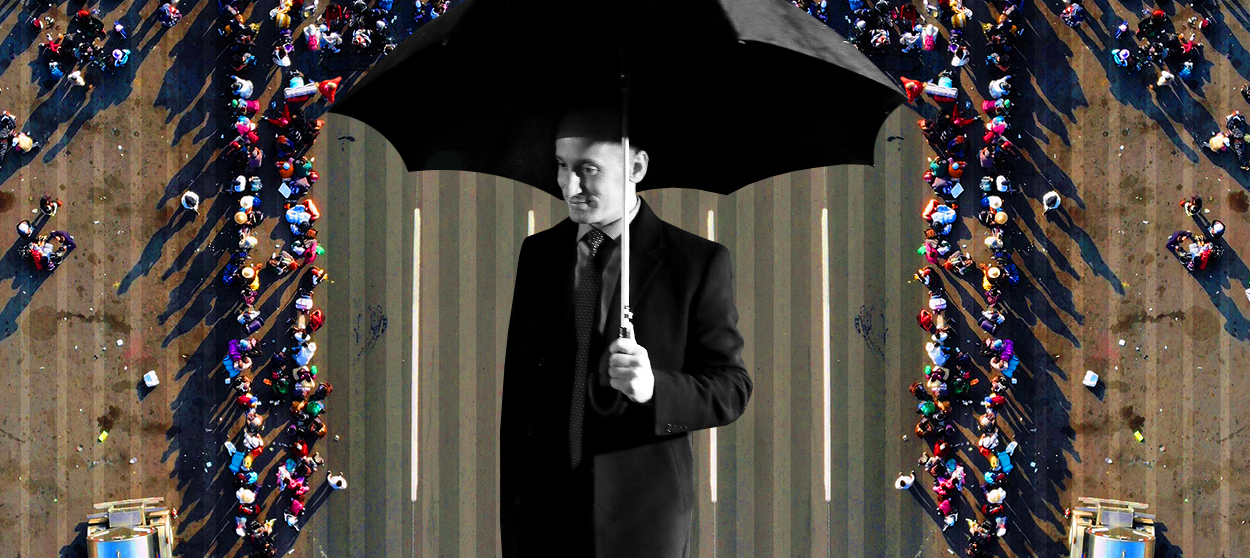Why Stephen Miller's sanctuary city plan might actually be great for sanctuary cities
Time to call his bluff


A free daily email with the biggest news stories of the day – and the best features from TheWeek.com
You are now subscribed
Your newsletter sign-up was successful
Attorney General William Barr and White House aide Stephen Miller have come up with conflicting plans to deal with the rush of fleeing Central American migrants flocking the southern border. Barr wants to deny them bail and hold them in pens on taxpayer dime. Meanwhile, Miller wants to release them to sanctuary cities that are defying Trump's draconian interior enforcement designs to teach these cities a lesson.
Barr's plan is idiocy that is unlikely to accomplish anything. But if sanctuary cities play their cards right, Miller's plan could work out well for everyone and be instructive in ways that he doesn't even realize.
President Trump had campaigned on controlling the border but, embarrassingly, it's become an even bigger mess on his watch. Border apprehensions, although nowhere close to the 1.6 million high in 2000, are significantly up. In the last two months alone, about 190,000 asylum seekers have been apprehended compared to 310,000 in all of 2017, the year Trump assumed office.
The Week
Escape your echo chamber. Get the facts behind the news, plus analysis from multiple perspectives.

Sign up for The Week's Free Newsletters
From our morning news briefing to a weekly Good News Newsletter, get the best of The Week delivered directly to your inbox.
From our morning news briefing to a weekly Good News Newsletter, get the best of The Week delivered directly to your inbox.
Barr's bright idea to deal with the situation is to end the long-standing practice of releasing some asylum seekers who pass the initial "credible fear" screening if they are able to post a bond. The alternative is to hold them for years and years as their case wends its way through hopelessly backlogged asylum courts. The statutory minimum bond amount, which asylum seekers lose if they fail to show up for their hearings, is $1,500. However, last year the Trump administration set the rate at $7,500, an increase of 50 percent from the median bond rate over the last five years, and even $10,000.
He's giving border agencies 90 days to ramp up their processing and detention capacity. After that, he says that any asylum seeker caught outside of an official port of entry will no longer be eligible for bond. He'll exempt unaccompanied minors and families with children because they can't be detained for more than 20 days as per law (although an advisory plan that Trump had convened this week recommended that he pass an emergency regulation to overrule that law). But all singles and childless families will be denied bond.
Barr thinks this will end the so-called practice of catch-and-release and deter asylum seekers from making the schlep to the border. The more likely outcome is that he'll incentivize even more families to bring kids with them. Either way, it is highly unlikely that his proposal will pass legal muster given that Barr is essentially proposing to give people who've merely exercised their legal right to request asylum no option but to remain in indefinite detentions. That should be a relief to taxpayers given that otherwise, instead of gaining millions in bond revenues, they'll be spending tens of millions for detention since it costs $320 per day to detain just each migrant.
Miller's plan, on the other hand, which Trump gleefully endorses on a nearly daily basis for all the wrong reasons, is a great idea.
A free daily email with the biggest news stories of the day – and the best features from TheWeek.com
"Democrats must change the Immigration Laws FAST," Trump tweeted earlier this week. "If not, Sanctuary Cities must immediately ACT to take care of the Illegal Immigrants."
Asylum seekers are of course not illegal immigrants. But even if they were it would be no catastrophe given that contrary to Trump's assertions, undocumented migrants aren't gang bangers and criminals. The best evidence suggests that they commit fewer crimes than natives.
Asylum seekers, who are fleeing violence, are even more law abiding. Indeed, all they are looking for is a safe place where they can work hard and build a life for themselves and their families. That also makes them a major economic boon.
Therefore sanctuary cities should not just roll out the welcome mat, as many of them are pledging to do if Trump makes good on his threat. They should go a step further and offer to pick up the tab for transporting these migrants so long as the administration gives them work permits right off the bat, as I recently suggested, not after six months as is currently the case. The permits could confine the asylum seekers to working in the sponsoring city for a while, but that would be a whole lot better than being in a detention camp. They could however petition other participating jurisdictions for sponsorship if they wanted to move. If they skipped town, that could count against their asylum petition. But to minimize that eventuality, sanctuary cities can send emissaries to the border to inform asylum seekers of the kind of local work that is available and let them choose the place that best suits their skills and experience.
There are about 300 state and local governments that are considered sanctuary jurisdictions. Even if they had to absorb a million asylum seekers this year, that would work out to an average of 3,333 per jurisdiction. That should be manageable for any city. Florida took in 125,000 low-skilled Cuban convicts in 1980 without any discernible economic or other ill-effect when Cuban dictator Fidel Castro dumped them on the state during the notorious Mariel Boatlift episode.
Many mayors and governors who have for years been pleading with Uncle Sam to give them special visas to recruit immigrants to relieve labor shortages or to boost flagging population can jump in on the action. If they aren't already sanctuary jurisdictions, they can declare themselves such.
Some will object that this will turn amnesty into a guest worker program. But if a proper guest worker program with Central American countries existed and asylum seekers used it to gain entry to the United States, would they object to that? The fact is that even folks in the most dangerous countries have multiple motives for seeking a particular destination country. Central American migrants looking for work would no more move to Raqqa even if ISIS paid them handsomely than asylum seekers would move to poverty-stricken Lesotho just because it is safe. The only way to ensure purity of motive is to have both an adequate asylum program and a guest worker program. But America's guest worker program is worse than its asylum program, which is why Central Americans are trying to push their way through the latter. But asylum also taxes border resources more than any other admission route. So the best way to relieve pressure on the border and restore order is to create a proper guest worker program, exactly what Trump won't even consider.
For now, the beauty of the plan to let sanctuary jurisdictions sponsor asylum seekers is that it would be a mini-experiment in federalizing immigration policy, something that many immigration reform proponents, including me, have been recommending since before Trump became president. Those jurisdictions that feel that asylum seekers will strain their resources more than they contribute to the economy don't have to admit them. But those that believe the opposite don't have to be deterred by such objections. Whoever turns out to be right will become an example for others without the federal government having to impose one-size-fit all solution on the whole country.
Between Barr and Miller, Miller is the implacable foe of immigration. Barr had no particular record of hostility toward immigrants before joining the White House. It would be delicious irony if Miller is the one who gets the ball rolling on something remotely good for immigrants.
Shikha Dalmia is a visiting fellow at the Mercatus Center at George Mason University studying the rise of populist authoritarianism. She is a Bloomberg View contributor and a columnist at the Washington Examiner, and she also writes regularly for The New York Times, USA Today, The Wall Street Journal, and numerous other publications. She considers herself to be a progressive libertarian and an agnostic with Buddhist longings and a Sufi soul.
-
 Health insurance: Premiums soar as ACA subsidies end
Health insurance: Premiums soar as ACA subsidies endFeature 1.4 million people have dropped coverage
-
 Anthropic: AI triggers the ‘SaaSpocalypse’
Anthropic: AI triggers the ‘SaaSpocalypse’Feature A grim reaper for software services?
-
 NIH director Bhattacharya tapped as acting CDC head
NIH director Bhattacharya tapped as acting CDC headSpeed Read Jay Bhattacharya, a critic of the CDC’s Covid-19 response, will now lead the Centers for Disease Control and Prevention
-
 ‘The surest way to shorten our lives even more is to scare us about sleep’
‘The surest way to shorten our lives even more is to scare us about sleep’Instant Opinion Opinion, comment and editorials of the day
-
 The billionaires’ wealth tax: a catastrophe for California?
The billionaires’ wealth tax: a catastrophe for California?Talking Point Peter Thiel and Larry Page preparing to change state residency
-
 Bari Weiss’ ‘60 Minutes’ scandal is about more than one report
Bari Weiss’ ‘60 Minutes’ scandal is about more than one reportIN THE SPOTLIGHT By blocking an approved segment on a controversial prison holding US deportees in El Salvador, the editor-in-chief of CBS News has become the main story
-
 Has Zohran Mamdani shown the Democrats how to win again?
Has Zohran Mamdani shown the Democrats how to win again?Today’s Big Question New York City mayoral election touted as victory for left-wing populists but moderate centrist wins elsewhere present more complex path for Democratic Party
-
 41 political cartoons for October 2025
41 political cartoons for October 2025Cartoons Editorial cartoonists take on Donald Trump, ICE, Stephen Miller, the government shutdown, a peace plan in the Middle East, Jeffrey Epstein, and more.
-
 Millions turn out for anti-Trump ‘No Kings’ rallies
Millions turn out for anti-Trump ‘No Kings’ ralliesSpeed Read An estimated 7 million people participated, 2 million more than at the first ‘No Kings’ protest in June
-
 Ghislaine Maxwell: angling for a Trump pardon
Ghislaine Maxwell: angling for a Trump pardonTalking Point Convicted sex trafficker's testimony could shed new light on president's links to Jeffrey Epstein
-
 The last words and final moments of 40 presidents
The last words and final moments of 40 presidentsThe Explainer Some are eloquent quotes worthy of the holders of the highest office in the nation, and others... aren't
